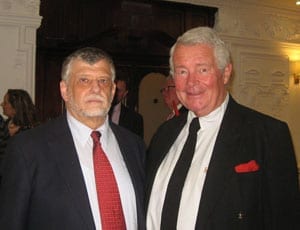Vadim J. Birstein wins the first Intelligence Book of the Year Award
Yesterday a reception was held in a fascinating hotel named the St. Ermin’s to announce the winner of the first Intelligence Book of the Year Awards.
The setting, just next to Scotland Yard, was most appropriate as the hotel has many connections to diplomacy, spying and covert operations. The building’s close proximity to the headquarters of the British Secret Intelligence Services (SIS, AKA MI6) was a reason it became a convenient venue where agents could meet in the 1930s and 1940s but it was when SIS took over an entire floor in 1936 to accommodate a new division that it became most important.
Section D, referring to “D” for destruction, was headed by Colonel Lawrence Grand and he was tasked with preparing plans for the sabotage of strategic sites in Europe that might fall into Nazi hands in the event of war. The division remained at the hotel until 1940 when Section D was absorbed into the Special Operations Executive but even after continued to use the St. Ermin’s as a meeting place.
The most famous spy linked to the hotel was Kim Philby. In his memoirs, My Silent War, Philby, whose cryptonym was “Stanley,” tells of being interviewed to join the SIS there and also of meeting Guy Burgess at his office in the building. He was also said to have used the hotel’s Caxton Bar with fellow Cambridge Five traitor Donald Duart Maclean, AKA “Homer.”
Invited by one of the judges, British intelligence analyst Glenmore Trenear-Harvey, I found it intriguing to attend an event which mixed such luminaries as the espionage journalist and author Harry Chapman Pincher, the Evening Standard’s Mira Bar-Hillel, former CBS reporter Jesse Schulman and Claire Rubinstein, formerly of the BBC. A smattering of journalists, a racehorse owner and various representatives of the hotel equally were a delight to converse with as the champagne flowed.
The judging panel for the award, which featured a list of some 34 books, included an intelligence bibliophile and historian named Daniel J. Mulvenna, formerly of the Security Service of the Royal Canadian Mounted Police; Andrew Lownie, an author of a forthcoming book on the life of Guy Burgess; Michael Smith, an author of many books on espionage; and Nigel West, a former Conservative MP, intelligence historian and author who is also known as Rupert Allason.
West spoke on behalf of the panel when he awarded Dr Vadim J. Birstein, a Russian-American historian and molecular geneticist, a £3,000 prize for his groundbreaking history of an acronym of a Russian phrase, SMERSH. In his account SMERSH: Stalin’s Secret Weapon Soviet Counter Intelligence in WWII, Birstein enlightens readers with his account of a phrase that means: “Death to spies.” Though the term is best known because of SMERSH being James Bond’s sinister opponent in Ian Fleming’s novels, the real life version was said to be far worse.
In his concluding remarks Nigel West commented that the spy genre is “thriving in literary terms” and indeed instead of SMERSH, may I add: “Long live the spies.”
For further information on the Intelligence Book of the Year Awards contact Tim Fordham-Moss on +44 (0) 771 049 1788 or email: tim@wixhill.co.uk
Further details are also listed on the St. Ermin’s Hotel’s blog: http://www.sterminshotelblog.co.uk/?p=278
